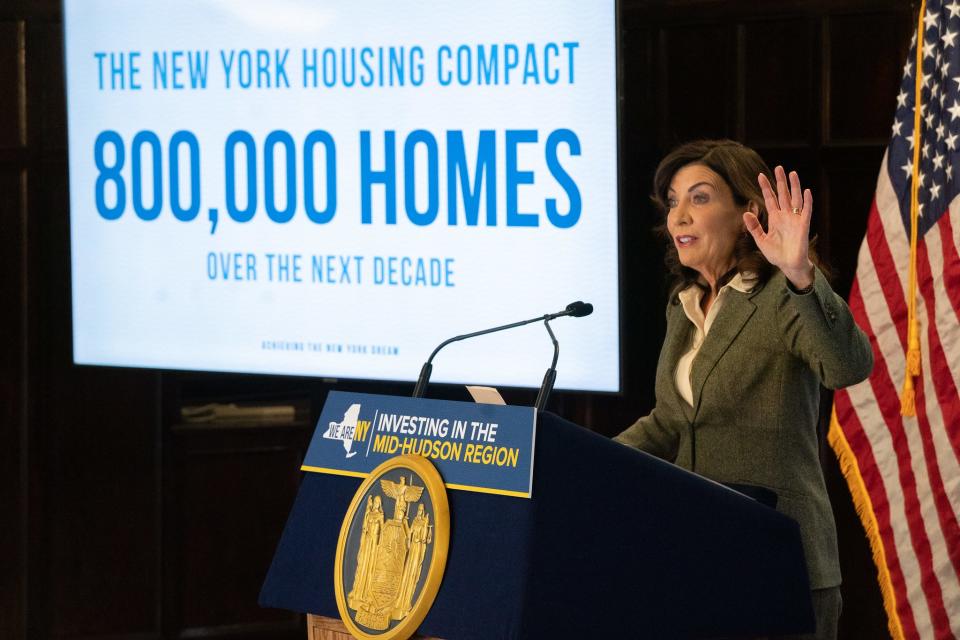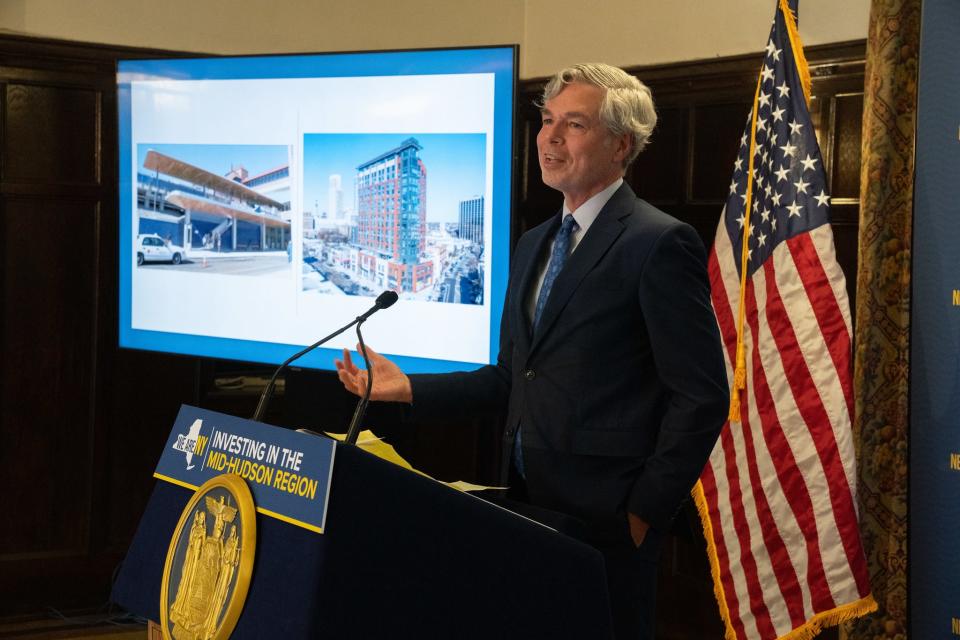Westchester leaders, in letter, balk at Hochul housing plan. Here's why
- Oops!Something went wrong.Please try again later.
They are many of the faces of local government in Westchester, and they're not happy.
The Westchester Municipal Officials Association's subcommittee on housing fired off a letter to Gov. Kathy Hochul on Feb. 28, pushing back on specific details of the governor's plan to build 800,000 housing units in New York in the next decade.
They were emphatic and crystal clear: They've read Hochul's New York Housing Compact and "without significant changes, it simply will not work":
Rezoning near train stations to increase density? A recipe for disaster, they wrote.
Allowing projects to skirt environmental review? A nightmare in the making.
Giving the state the power to overrule zoning boards and green-light development? A blank check for developers.

A budget tour
Hochul has been crisscrossing the state (she spoke at Pace University in Pleasantville last month), pushing her budget and, in particular, the New York Housing Compact that was the lynchpin of her State of the State address in January. Her plan is a mix of policy carrots and sticks, incentives to foster development and a mechanism to approve development over the opposition of local government.
Hochul wants to rezone a half-mile radius around MTA train stations to foster transit-oriented development. It's the kind of rezoning that cities such as Mount Vernon, White Plains, Yonkers and New Rochelle have implemented, allowing for more density and reducing the need for vehicles. But critics, including those letter-writing elected officials, see peril in Hochul's plan.
'Absurd on its face'
Pelham Mayor Chance Mullen signed the letter as a member of the subcommittee. He agreed that the lack of housing is a crisis long in need of remedy, but, in a note posted on the village website, Mullen wrote that parts of the governor's plan were simply unacceptable.
If the density levels in Hochul's transit-oriented development scheme were approved, "we’d be contemplating the potential addition of over 5,000 new homes and apartments in a village that currently has about 2,500 total households," Mullen wrote.
"It’s absurd on its face, and clearly the product of trying to create zoning without consideration of the local context," the mayor wrote.
'Suburbs are not monolithic'
Similar sentiments were echoed in the letter sent to Hochul co-signed by leaders from city halls and village halls across Westchester.
"The suburbs are not monolithic," the group wrote to the governor, and the blanket imposition of transit-oriented development zones "would require us to permit development that would, in many cases, double, triple, and even quadruple the total number of housing units in some of our municipalities."
The impact of such development on public services such as schools, traffic and public safety — coupled with the prospect that transit-oriented buildings would be exempt from environmental review — "would be devastating to the communities we are sworn to serve."
"No elected official, in good conscience, can support such an unreasonable approach to community growth," the committee wrote. They urged flexibility, not a rigid half-mile radius, and proposed density be measured on a case-by-case basis.
The letter was signed by Pelham's Mullen, Mayor Nicola Armacost of Hastings-on-Hudson, Bedford Supervisor Ellen Calves, Buchanan Mayor Theresa Knickerbocker, North Salem Supervisor Warren Lucas, Mount Kisco Mayor Gina Picinich, Pleasantville Mayor Peter Scherer and Anne Janiak, the association's executive director. It was endorsed by 25 mayors and supervisors from across Westchester.
Seeking 'nuance,' avoiding 'perverse incentives'
Hochul's plan would mandate 3% growth in housing stock over a three-year period in downstate regions including Westchester, another bone of contention cited in the letter. Better, the elected officials wrote, to calibrate the ramping-up of housing with more "nuanced housing targets."
The governor's plan to circumvent the approval process by giving the state authority to approve developments rejected by local boards was also a nonstarter, the panel wrote.
"We would caution against emboldening developers to cut corners, evade important environmental and social concerns, and ignore local residents and community groups who can suggest important improvements toproject proposals," they wrote.
"We believe a fast-track approval process that circumvents local authority will create perverse incentives for developers and will deprive municipalities of valuable leverage needed in negotiations."
Further, the officials wrote, the plan's Safe Harbor protections — to take into account good-faith efforts to raise housing stocks — should be expanded, as should the timeframe for implementation.

Who didn't sign on to the letter
There are notable names, and localities, missing from the letter to Hochul, the mayors of the county's four largest cities, representing more than a third of Westchester's population.
White Plains Mayor Tom Roach, Yonkers Mayor Mike Spano and New Rochelle Mayor Noam Bramson — all of whom were on hand for Hochul's speech at Pace last month — did not add their names to the letter. Spano and Roach are on the Westchester Municipal Officials Association executive committee. Also missing from the letter was Mount Vernon Mayor Shawyn Patterson-Howard, whose name appears on the letterhead, as the group's secretary.
Roach closed out Hochul's Pace visit, praising the Housing Compact for its flexibility "so that individual communities can find their way to meet their goals."
He talked about all the housing projects that were completed, under way or on the horizon in White Plains, nearly 7,000 units.
"We have recognized for a long time that the way to get your downtown back is not through an aquarium or a merry-go-round, but through having people live in your downtown and want to be in your downtown," Roach said. "That's why Mike Spano got into it. That's why Noam Bramson got into it."
Roach encouraged his fellow elected officials to keep an open mind, and to work with Hochul's administration. "Sit down at the table and make this work," Roach said.
A long process
Hochul's proposal is just that, and is subject to agency and legislative review that will take months.
Mullen, in his post to his constituents, said he has met with the village's representatives in Albany, Assembly member Amy Paulin and state Sen. Nathalia Fernandez. He also plans to meet with Ruthanne Visnauskas, whose Division of Housing and Community Renewal will create the final plan.
"The commissioner was eager to partner with us on more reasonable solutions," Mullen wrote. "I’ve been pleased to see that our community’s development work has earned us credibility in the conversation and a very important seat at the table."
This article originally appeared on Rockland/Westchester Journal News: Westchester leaders, in letter, blast Hochul housing plan

